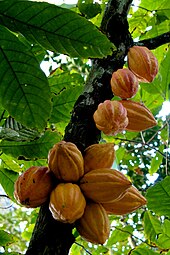
| Flowering plant families (APG IV) | |||||
|---|---|---|---|---|---|
|
|
|||||
| Early-diverging flowering plants | |||||
| Monocots: Alismatids • Commelinids • Lilioids | |||||
|
|
|||||
Eudicots
|
The malvids consist of eight orders of flowering plants: Brassicales, Crossosomatales, Geraniales, Huerteales, Malvales, Myrtales, Picramniales and Sapindales.[a] This subgroup of the rosids is divided into 59 families of trees, shrubs, vines and herbaceous plants.[4][5]
The cabbage family includes broccoli, turnips and radishes.[6] The ornamental geraniums, and their many hybrids and cultivars, come from five species of Pelargonium.[7] The mallow family includes the plants that yield cocoa beans, Cola nuts, cotton and jute.[8] Pomegranates were cultivated by Bronze Age cultures, and wild water chestnuts were consumed in large quantities by prehistoric Europeans.[9] Eucalyptus trees are the tallest known flowering plants, up to 100 m (330 ft) or more; they are grown for timber and for their oils, used in candy, perfumes and cough medicine.[10] Mangos and cashews come from the same plant family as poison ivy, and can sometimes trigger allergic reactions.[11] Canada produces most of the world's maple syrup, and the maple leaf is the country's national symbol.[12] Citrus agriculture outranks other sweet-fruit industries in warm climates.[13]
- ^ Christenhusz, Fay & Chase 2017.
- ^ Angiosperm Phylogeny Group 2016.
- ^ POWO.
- ^ Stevens 2023, Summary of APG IV.
- ^ Christenhusz, Fay & Chase 2017, pp. 10, 342–419.
- ^ Christenhusz, Fay & Chase 2017, pp. 415–419.
- ^ Christenhusz, Fay & Chase 2017, pp. 342–343.
- ^ Christenhusz, Fay & Chase 2017, pp. 388–393.
- ^ Christenhusz, Fay & Chase 2017, p. 347.
- ^ Christenhusz, Fay & Chase 2017, pp. 352–353.
- ^ Christenhusz, Fay & Chase 2017, p. 370–371.
- ^ Christenhusz, Fay & Chase 2017, p. 374.
- ^ Christenhusz, Fay & Chase 2017, p. 375.
Cite error: There are <ref group=lower-alpha> tags or {{efn}} templates on this page, but the references will not show without a {{reflist|group=lower-alpha}} template or {{notelist}} template (see the help page).